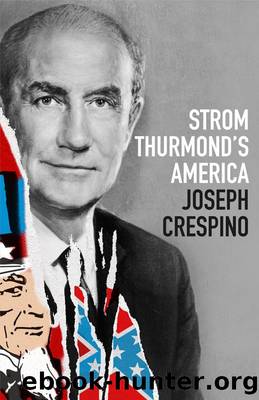Strom Thurmond's America by Joseph Crespino

Author:Joseph Crespino [Crespino, Joseph]
Language: eng
Format: azw3
Publisher: Farrar, Straus and Giroux
Published: 2012-09-03T16:00:00+00:00
10
ANNUS MIRABILIS
(1968)
On June 22, 1968, Strom Thurmond endorsed Richard Nixon to be the next president of the United States. The announcement dumbfounded political observers in South Carolina who expected Thurmond to support George Wallace, whose campaign was drawing comparisons to Thurmond’s race twenty years earlier. Unlike 1948, however, Wallace actually had support from outside the South, among working-class whites in northern industrial states. One of the favorite topics early in the campaign season was handicapping the “Wallace effect,” gauging which party he would hurt more—Republicans in the South or Democrats in the North.
The danger to the GOP in South Carolina was real. Wallace backers had provided invaluable assistance to Thurmond and other Republicans during the 1966 midterms. Throughout 1967 they expected that the GOP would nominate a moderate or a liberal and that Strom Thurmond would eventually be in Wallace’s corner.
Yet Thurmond never seriously considered backing Wallace. In February 1968 he issued a statement denying reports that he supported the Alabaman. He was committed to the GOP, he said, because of its strong stand against centralized government and communism and because of its concern about the lawlessness rampant throughout the country. Thurmond was convinced that unlike in 1948 serious differences existed between the two major parties, on both foreign and domestic issues.1 Not to be discounted either was the fact that he had managed to carve out a pleasant place for himself in both the national and the state GOP. A Wallace endorsement would jeopardize that hard work.
More than Wallace, the person with whom Thurmond’s politics fit most neatly was Ronald Reagan, who was expected to get in the race for the Republican nomination soon. As smitten by the new California governor as anyone, Thurmond likened Reagan’s glamour to that of the late John F. Kennedy. Reagan’s rise had been so meteoric, however, as to leave Thurmond with doubts. He had held down his job in Sacramento for little more than a year, and Thurmond wondered whether he was truly ready to be leader of the free world. Throughout the nominating process, Thurmond and associates admitted that while their hearts were with Reagan, their heads were with Richard Nixon. The question was why Thurmond went with his head.
Fear of failure seems to have been the most important factor. The “Goldwaterloo” of 1964 still weighed heavily on the GOP’s collective consciousness. Thurmond had lots of company among Goldwaterites in his preference of Nixon over Reagan. Goldwater himself supported Nixon, as did the leading conservative “columnist-oracles” of the day: William F. Buckley Jr., John Chamberlain, William S. White, and Russell Kirk.2 Many conservatives worried that an all-out push for Reagan à la Goldwater in 1964 would only ease the path for a dreaded moderate or liberal nominee, such as Nelson Rockefeller or George Romney.3
Like all these conservatives, Thurmond settled for Nixon given the alternatives. Yet Nixon was not without attractive qualities. Thurmond saw him as a figure of extraordinary experience in a moment of genuine crisis in American foreign and domestic affairs. Nixon was not an old man in 1968, yet he had been on the national scene for a long time.
Download
This site does not store any files on its server. We only index and link to content provided by other sites. Please contact the content providers to delete copyright contents if any and email us, we'll remove relevant links or contents immediately.
The Secret History by Donna Tartt(16608)
The Social Justice Warrior Handbook by Lisa De Pasquale(11485)
Thirteen Reasons Why by Jay Asher(7782)
This Is How You Lose Her by Junot Diaz(5753)
Weapons of Math Destruction by Cathy O'Neil(5029)
Zero to One by Peter Thiel(4817)
The Myth of the Strong Leader by Archie Brown(4785)
Promise Me, Dad by Joe Biden(4440)
Stone's Rules by Roger Stone(4412)
Beartown by Fredrik Backman(4404)
How Democracies Die by Steven Levitsky & Daniel Ziblatt(4392)
The Fire Next Time by James Baldwin(4336)
100 Deadly Skills by Clint Emerson(4070)
A Higher Loyalty: Truth, Lies, and Leadership by James Comey(4025)
Rise and Kill First by Ronen Bergman(4008)
The David Icke Guide to the Global Conspiracy (and how to end it) by David Icke(3875)
The Farm by Tom Rob Smith(3869)
Secrecy World by Jake Bernstein(3773)
The Doomsday Machine by Daniel Ellsberg(3725)
